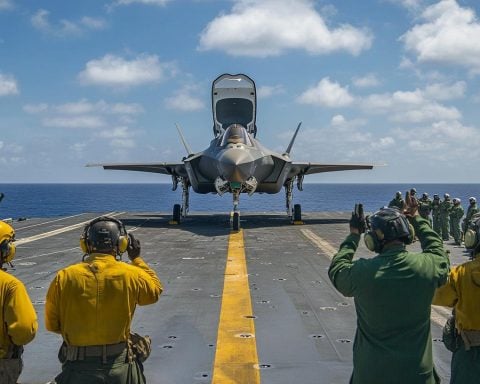In a surprising move, Turkey’s Ministry of Defense has announced a shift in plans regarding the modernization of its fighter jets. Instead of upgrading its fleet of 79 F-16C fighter jets in collaboration with American giant Lockheed Martin, Turkey will rely on its own aerospace corporation, Turkish Aerospace Industries (TUSAŞ), for upgrades.
This decision marks a significant move towards independence in Turkey’s defense capabilities. The TUSAŞ facilities are equipped to handle the sophisticated upgrade without external assistance, basing their efforts on the domestic modernization program, Özgür. This program aims to extend the lifespan and capabilities of existing aircraft, including integrating them with the indigenous Murad radar system.
Notably, Turkey’s acquisition of 40 brand new F-16 Block 70/72 fighters remains unaffected. Ankara has already paid $1.4 billion towards this purchase, estimated to total around $7 billion, showing no signs of disruption. The focus of the change is strictly on the mid-life upgrade of current aircraft.
While the exact modernization details remain under wraps, there is a clear intent to replace the entire avionics suite with domestic products, reflecting a push away from foreign reliance. This move is underscored by Turkey’s pursuit of independence, highlighted by the Özgür program’s name, meaning “free” in Turkish.
Previously, Turkey was removed from the F-35 program after acquiring Russian military systems, but recent developments suggest renewed attempts to bridge defense ties with the U.S. amid international negotiations. As Turkey continues to develop its indigenous fighter, the Kaan, its defense strategy exhibits a remarkable shift towards self-reliance and technological advancement.
Turkey’s Bold Aviation Shift: How Will Self-Reliance Shape the Future of Defense Technology?
In a landmark decision that could reverberate through global defense sectors, Turkey’s Ministry of Defense has opted for a domestic upgrade of its F-16C fighter jets instead of collaborating with the American defense giant, Lockheed Martin. This strategic move towards technological self-reliance highlights Turkey’s ambitions to enhance its defense capabilities without external aid. But what does this signify for the development of new technologies and the broader horizon of human advancement?
Enhancing Defense Through Self-Reliance
Turkey’s decision marks a pivotal step toward independence in its defense sector, with Turkish Aerospace Industries (TUSAŞ) spearheading the modernization process. The Özgür program, an ambitious domestic modernization initiative, promises to revolutionize Turkey’s aerial capabilities. At the heart of this program are plans to replace existing avionics with Turkish-made systems, introducing advanced features like the indigenous Murad radar system.
Fostering Technological Innovations
The pursuit of a self-reliant defense ecosystem may spark a wave of innovation in Turkey, particularly in aerospace technology. As TUSAŞ tackles the sophisticated upgrade independently, this move could lead to breakthroughs beyond military applications. New technologies developed in the process could advance civilian sectors, boosting Turkey’s high-tech landscape.
Pros and Cons of the Transition
The advantages of Turkey’s decision are manifold. By developing indigenous defense technologies, Turkey can reduce its dependency on foreign suppliers, potentially leading to cost savings and bolstered national security. Moreover, successful implementation could position Turkey as a key player in the global defense market.
However, this path has its drawbacks. Developing sophisticated technology in isolation can be resource-intensive and pose significant technical challenges. Additionally, Turkey must overcome the hurdles of establishing international credibility for its homegrown systems, especially in a market dominated by established players like Lockheed Martin.
What Are the Global Implications?
This move may set a precedent for other nations considering similar shifts. As countries seek more control over their defense capabilities, Turkey’s approach could inspire others to invest in domestic industries and innovation. Nevertheless, the geopolitical ramifications are complex. Reduced reliance on foreign technology might strain existing alliances and reshape defense collaborations globally.
Controversies and Questions
Critics argue that reliance on purely domestic upgrades might lead to technological stagnation, as collaboration often accelerates innovation. There are questions about whether Turkey’s self-reliance will extend to robust cyber defenses, essential in modern warfare.
Continued Path to Self-reliance?
Turkey’s course portrays the country’s determination to control its defense future. As it continuously seeks to reconcile with the U.S. in defense matters while maintaining autonomy, will Turkey’s strategy align with or depart from broader international trends?
As the world watches these developments, curiosity lingers about how this decision will shape not just Turkey’s defense sector but also global defense strategies and technological evolution.
For more insights into global defense trends and technological advancements, visit Turkish Airlines and Lockheed Martin.



















